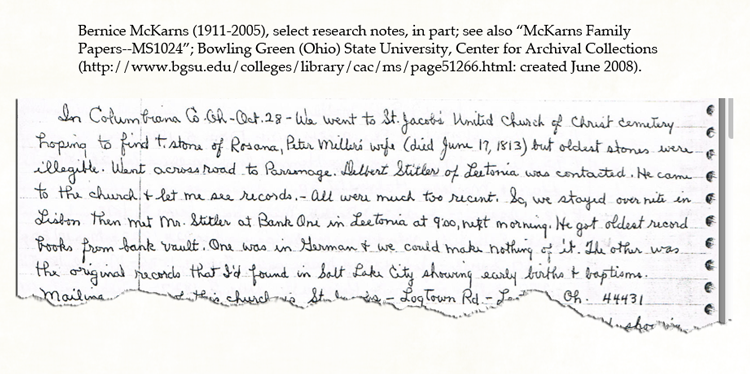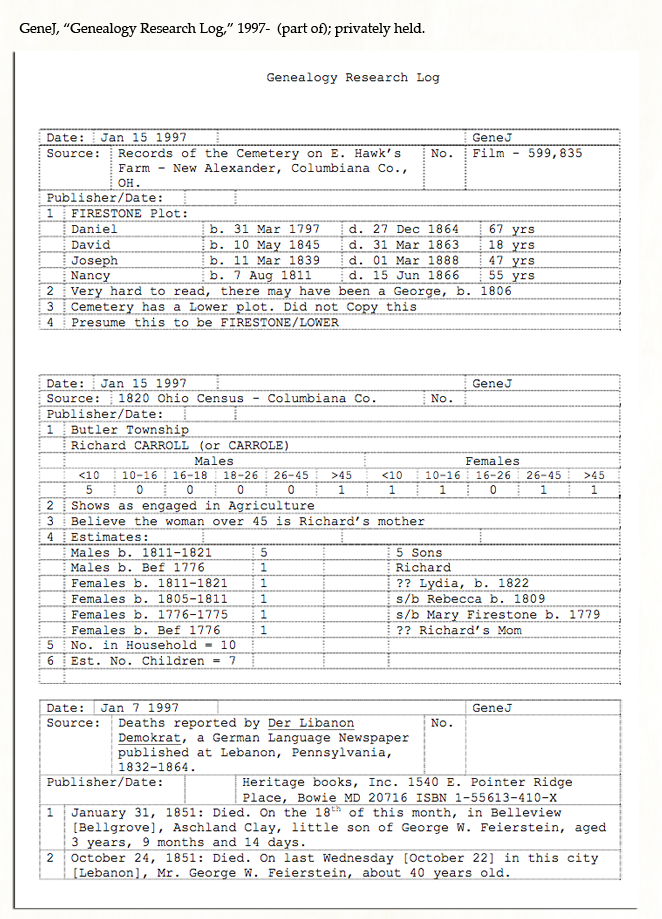I have only recently become interested in my family tree. I am using PAF and am aware of GEDCOM. In addition to the details that PAF and GEDCOM support, what other information should I be recording?
-
1Welcome Joel. You have asked a question so BIG that it might not get you useful answers. Unless of course, you are happy with the suggestion to record everything you find. I suggest that you read through the questions already on the site then pick a narrower topic that interests you and ask a more focused question; perhaps about a type of record or a place or a period of time. Then other users of the site can offer you some really practical advice.– FortiterCommented Nov 19, 2012 at 11:18
-
Hi Joel. Welcome to genealogy (and to genealogy.se). You are going to love it. It is a big question, but you may have something specific to add that would help us understand the context of your question. I've added an answer below and so has Duncan. You can let us all know if we are on the right track by editing your question and providing more direction. Thanks again for supporting genealogy.se.– GeneJCommented Nov 19, 2012 at 15:09
4 Answers
Alot depends on what you want to get out of your genealogy research. Start with what you know. Add how you know it (sources). If you record your sources, you'll appreciate it later when you are looking for it again.
Are you interested in a particular ancestor and his/her descendents? Or are you interested in fanning out your ancestor tree? Is there a particular family reunion coming up that you are interested in the ancestors of that particular branch of the tree? Are you interested in joining lineage (descended from a particular person) or heritage (descended from a collective of people, eg fought in the US War of 1812) society?
Another whole area is DNA. Males have the advantage we each carry the Y-chromosome of our father, father's father, etc. Both males and females carry the mitochondrial DNA of their mother, mother's mother, etc. So those two particular lines are of particular interest to research.
One strong recommendation I have is to sit down with your older relatives and ask them questions, preferably recording it. You'll find you'll be really glad you did this later. I suspect you'll also discover some things right away you didn't realize. Don't just ask about relatives, ask about conditions when they grew up, major events, etc. It blew me away when my late father mentioned mentioned that when he was a kid, the 'vets in the parade' were Civil War veterans instead of the WWII veterans in today's parades.
One decision you'll have to make is how much you'll be wanting to share what you know and how much you want to co-operate with others. I find the pando (one big tree) at werelate.org useful. It's particularly useful the farther back you go (ie it's unlikely anyone has entered your grandfather yet, but entirely possible they've entered your 10x grandfather). One of the reasons I find it useful is that it's pando of sources as well.
Another thing you'll have to decide is your budget - both time and money. Some sites (eg this site, werelate, findagrave) are free, some societies (eg New England Historical Genealogy Society) cost money to use their resources, and some commercial sites (eg ancestry.com, myheritage.com, etc) exist with you as their target customer. You've already discovered this stackexchange site. It's still in beta (just starting up) but hopefully will be useful to you. Spend some time looking thru the questions already here to get a feel. It might also give you other avenues to explore you hadn't thought of yet.
Most of the websites mentioned here and elsewhere on genealogy.stackechange will have 'getting started' help. There are also many blogs, podcasts, and courses (both online and classroom). Read thru many of them and form your own consensus based on what you want to do. Note many of the commercial sites have an obvious incentive for you to join their site and pay them. Look at several and decide what's best for you.
Most importantly, record your sources. Put down the kind of source, author, title or description, location of the source, and any other information that would be needed for anyone (including yourself) to find the item of data again. This is the most vital item that beginners often overlook. PAF, like other genealogy programs, has a mechanism for recording sources, use it!
As for what personal data to record (beyond what simply interests you), the guiding principle is to record information that will help identify the person and their relatives, and help resolve ambiguities with other people. So obviously birth & death dates and places as you find them out, but also dates and places of marriage, residence, educational milestones, and other life incidents. For people living in recent decades, much more may well be available than you need to seek out for identification, but as you get back in time items will be scarcer and you will want to search out more obscure data such as property deeds. You will want to record a person's siblings and children because knowing these close relatives can be essential to identifying earlier generations.
Ummm. How about anything and everything that may be relevant or interesting to you.
Genealogy is not just defined by the fields that are in your genealogy software. There is the ever-present "note" field that allows what you record to be open ended. And don't forget the "objects" (pictures, videos and sound files).
Genealogy is more enriching when you extend it to more than just the names, events and facts. When you get into the family stories and family history, then you'll really enjoy it.
-
4I was thinking along the lines of details to look for and record that may be interesting to those that follow. I have no real understanding of additional items to include and was looking at some sort of predefined list that I could compare to. Then I would know what to keep if I stumbled across it or even better, what additional things to search for. I am happy to use another software product or other techniques, I just would like it to be a useful compilation.– JoelCommented Nov 20, 2012 at 0:50
-
1@Joel: When you stumble across something good, you'll know it! I don't know of any such lists. Why don't you start your own?– lkesslerCommented Nov 20, 2012 at 2:22
-
So if I were to record everything I find, you are saying this would be beneficial to people in the future?– JoelCommented Nov 22, 2012 at 7:24
-
1@Joel: If you organize everything you find into a structured compendium of information, with your opinions about each item as to what it provides and whether or not you found it useful in any of your conclusions , then this will be helpful to others who want to follow up on the same lines. But if you "just" record everything, then it won't help much.– lkesslerCommented Nov 22, 2012 at 15:17
Reading genealogy journals, articles and blogs is a great way to discover the way others relate to their research and their historical families. Perhaps the structure of a genealogical biography, in the spirit of Register and Quarterly style, provide a little direction. All too abbreviated here, a biography can be broken down into three sections:
- Genealogical Summary Paragraph: This identifies the subject, his/her birth and death and parents. Also his/her marriage(s), including each spouse's birth/death and parents.
- Life Story: This is about the subject's life--the different places he/she moved, his/her education, military or voluntary services, vocations ... What were the events that impacted on this person's life (and how)?
- Child List: This is a list of the children in the household--they may have been born to the subject or one of the spouses; they may have been adopted or otherwise considered a child of that household.
To learn more about genealogical biographies, see Lynn Betlock's blog, "The Daily Genealogist, Writing in Register Style," 21 Sept 2012, or check out
- Michael Leclerc and Henry Hoff, editors, Genealogical Writing in the 21st Century: A Guide to Register Style and More, 2nd ed. (Boston, Mass.: New England Historic Genealogical Society, 2006).
- Joan F. Curran, Madilyn C. Crane, and John H. Wray, authors, edited by Elizabeth Shown Mills, Numbering Your Genealogy: Basic Systems, Complex Families, and International Kin, rev.ed. (Washington: NGS,2008).
Separately, as you are developing your own approach to "what" you want to record, consider starting a research journal or a research log.
Learning about my family history has been progressive and changeable. There is a good chance that what I thought I might have known yesterday will change based on what I learn tomorrow.
Below is a snippet from one of the research journals kept by Bernice McKarns (1911-2005). She is no longer with us, but her records are as valuable to us today as they likely were to her when she made them.

Bernice used spiral notebooks. My journal combines the characteristics of a research log and a research journal. I've always used a text editor or word processor. A few entries to my 1997 log appear below.

Some opt for more traditional research logs, and some genealogy software programs incorporate research logs or features that are similar. The FamilySearch Wiki has several pages dedicated to logs: "Research Logs," "Keeping a Research Log," "Prepare a Research Log,," "Describe the Records on a Research Log." You can read more about research logs on genealogy.SE. See the answers linked below or search the site.
- https://genealogy.stackexchange.com/a/1536/7
- https://genealogy.stackexchange.com/a/1526/7
- https://genealogy.stackexchange.com/a/1559/7
Remember to have fun!